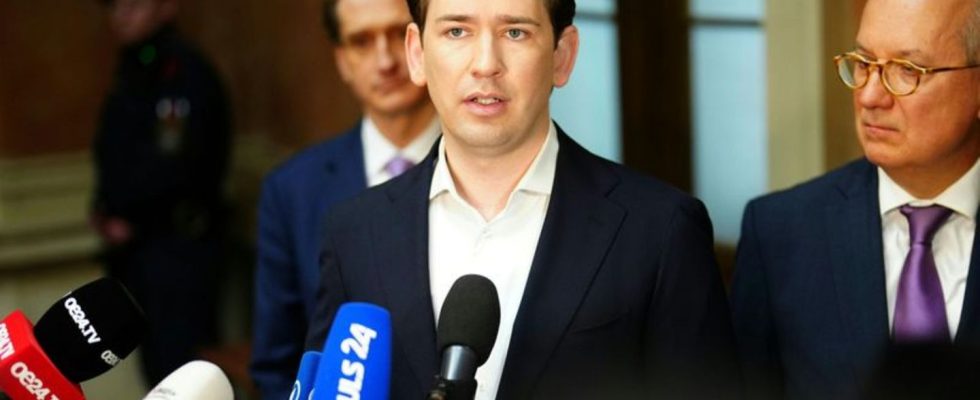Justice
Ex-Chancellor Kurz in court for possible false statements
Sebastian Kurz speaks to journalists before the start of the trial in the Vienna Regional Court. photo
© Eva Manhart/APA/dpa
Once on the government bench, now in the dock: Sebastian Kurz has to answer to an investigative committee for statements he made. Did Austria’s former chancellor lie for image reasons?
Prosecutors are confident in their puzzle. The analysis of countless chats on cell phones of top politicians and the statements of ex-confidants prove from their point of view: Sebastian Kurz was the ÖVP’s chancellor.FPÖ coalition from 2017 to 2019 in Austria was the decisive authority for practically all top personnel.
This reality is in contrast to the then head of government’s appearance in the Ibiza investigative committee in June 2020. There, in the case of the appointment of his confidant Thomas Schmid as head of the state holding company Öbag, he only admitted that he was informed but not actively involved. The result: Because of suspicion of making false statements, the 37-year-old, once a celebrated conservative star in Germany, has had to answer before the Vienna Regional Court since Wednesday.
Confidence and side blows
When Austria’s ex-chancellor appeared shortly before the start of the hearing, dozens of cameramen and journalists gathered around him, as in the best times of government. He used the stage to spread confidence and to take swipes at the political establishment and the judiciary. “I hope for a fair trial and that at the end of the day the allegations turn out to be false,” said the ex-politician. At the same time, he criticized that the investigations could be politically influenced. “I think it’s very worrying that more and more attempts are being made to make politics with advertisements.”
The public prosecutor’s indictment, which includes two other suspects in addition to Kurz, has 108 pages. At the start of the trial, senior public prosecutor Gregor Adamovic drew a picture of a postal allocation between the ÖVP and FPÖ, driven by party and power politics, around the influential state holding company Öbag, which, according to the 2022 balance sheet, managed assets worth 30 billion euros through corporate investments. Kurz pulled the strings, both when it came to the question of the top position and the appointment of the supervisory board, said Adamovic.
The then Finance Minister Hartwig Löger was only allowed to make personnel suggestions, but the Chancellor had the last word, according to the prosecutor. Regarding Kurz’s statement in the U-Committee that he was informed but not involved, Adamovic said: “This statement is wrong.” Kurz absolutely wanted to avoid the impression in the committee that he was an actor. “These are not harmless half-truths, they are untruths.” According to the public prosecutor, the concealment of substantial information is also part of an untrue statement.
Defense demands acquittal
Kurz vehemently denies the allegations. His lawyer speaks of a “mere accumulation of bogus arguments.” The defense attorney called for an acquittal.
The offense carries a prison sentence of up to three years. The process is initially scheduled to last three days, but is likely to take significantly longer. And whatever the verdict is in the end: either the public prosecutor’s office or the defense will probably appeal, so a legally binding verdict seems a long way off.
In any case, the media interest is enormous at the start. Almost 100 journalists have registered for the trial. At least 21 witnesses, including ex-Vice Chancellor and former FPÖ leader Heinz-Christian Strache and former Kurz confidante Schmid, are scheduled to appear in court.
Ibiza affair
The trial against Kurz is part of the process of coming to terms with the government era of the conservative ÖVP and the right-wing FPÖ. The coalition collapsed in 2019 after the publication of a video secretly recorded in Ibiza. The then FPÖ leader Heinz-Christian Strache appeared vulnerable to corruption. The Ibiza Committee of Inquiry should investigate evidence of corruption in the Kurz government.
Regarding the possible motive for a false statement, the public prosecutor’s office said that Kurz, as chancellor – very popular at the time of the statement – wanted to prevent damage to the reputation of himself and his ÖVP. The young head of government had promised the citizens a “new style” in which the image of power-political favoritism in the allocation of posts would probably not have fit, said Adamovic.
Kurz resigned from the office of Chancellor in autumn 2021 and left politics completely a short time later. He now runs a cybersecurity company with 50 employees in Tel Aviv as well as a consulting and investment firm. He doesn’t have to worry about the costs of the procedure. The ÖVP covers all expenses for the defense of its former party leader.

